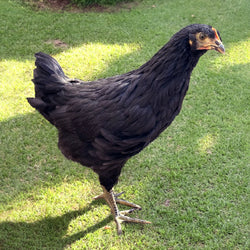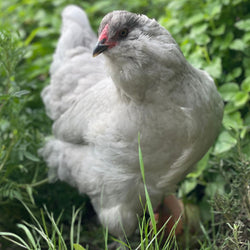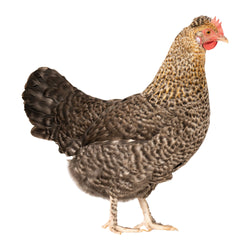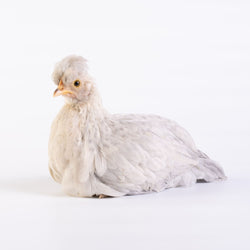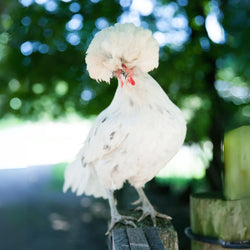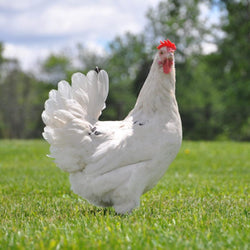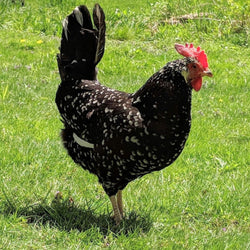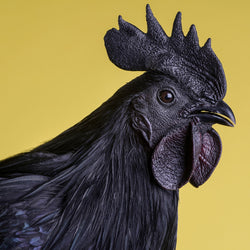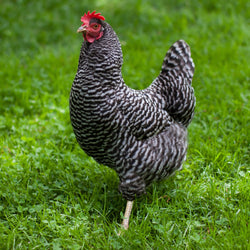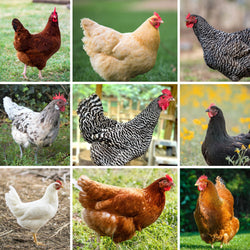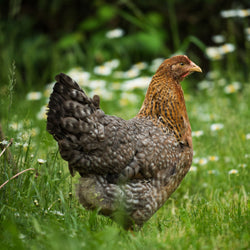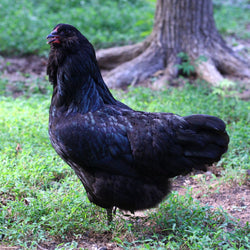page=6/--
Frequently Asked Questions
Here we answer the most commonly-asked questions about ordering, chicken care, and more.
Why is my chick's beak getting crooked, and what should I do?
Usually, chickens with crossed beaks or scissor beaks lead long, normal lives. In most cases, this defect is caused by the chick positioning herself incorrectly for hatching. Normally, one wing will shelter the head inside the shell. But if a chick doesn't have her wing positioned over her head, the skull can malform, and it will reveal itself within the first few weeks as a cross beak or scissor beak as she begins to grow. What causes this problem isn't fully understood. Think of it as sort of the chicken equivalent of a breech birth: the chick has just not...
Read MoreAre oversized eggs that are difficult for my hens to pass caused by overfeeding?
It is not likely that the problem is overfeeding. We recommend feeding free choice and not limiting their feed: underfeeding usually causes more problems than offering extra. It is rare for a layer to overeat ("meat" birds like the sickly Cornish Rock crosses are different, and often overeat). If it really concerns you, you might cease fatty treats, or perhaps double check the protein level in your food. Around 16% protein or so is good for layers, so if your protein level is higher than that, you might switch to a slightly lower protein feed. For the most part, though,...
Read MoreDo ticks bite chickens?
Probably not. Chickens actually eat deer ticks, wood ticks, and dog ticks (as well as other types), and these are the most common ticks that bother humans and canines. Perhaps these ticks are what you are seeing? If so, there is probably no special cause for concern. Even when you live in Tick Central, where a half hour hike means you may have to brush off many, many ticks from your clothing, you'll have few ticks in the immediate area of the chicken coop because the chickens will eat all they can find. This is especially true if you keep...
Read MoreWhy does my chicken have a bare spot on her chest? She's not molting!
If she's not molting, isn't getting picked on and isn't suffering from external parasites like mites or lice, it's possible that the bare spot on her front is caused by broodiness. Broody hens often lose the feathers on their lower breasts so that their bodies can be closer to the eggs they are trying to warm and incubate. It is called a "brood patch." Silkies often go broody Since this is a hormonal condition, it is possible she will lose or pluck feathers during broodiness whether or not she actually has any eggs. If she's been broody lately and you've...
Read MoreI got the Marek's vaccination for my chickens, but one chicken seems sick! Is the vaccination not working?
If your chicken received the Marek's vaccination, she will most likely be protected from the symptoms of Marek's disease, but a small percentage of birds will still get sick with Marek�s, even when vaccinated. Also, there are many other illnesses chickens can get. For instance, if you got a whooping cough vaccination as a kid, you can still get the flu, or liver disease, or bronchitis, or an ear infection, or lyme disease and so on. The same goes for your chicken. Vaccinating for Marek�s disease will not protect your chicken from all sicknesses, only Marek's. As always, if you...
Read MoreIs bumblefoot contagious?
First, we're sorry that your flock is having problems with bumblefoot! The more technical name for this problem is ulcerative pododermatitis, but most people, amateurs and professionals alike, refer to the problem by the common name of bumblefoot. Bumblefoot is a serious problem, but it's not contagious in the way a cold is contagious. Still, read on because it's also true that you may sometimes have chronic issues with bumblefoot in a flock---and there are still some causative factors you may be able to address if you are having frequent problems with bumblefoot in your flock! First, call your vet...
Read MoreShould I order extra chickens so enough survive into adulthood?
Normally you want to order the number of chickens you want to end up with---don't order extras with the expectation that some will die. But there are a few considerations you may want to take into account. Whether you lose any over the course of bringing them to laying age will also depend in part on the conditions you provide for them at your home. For instance, if your brooder isn't hot enough---or if it's too hot!---you may lose some chicks. Baby chicks can drown in waterers that are too deep, and if waterers or feeders are not securely seated,...
Read MoreIs wry neck a genetic weakness that I should be worried about seeing in my chickens' offspring?
If you have a hen with wry neck, it is probably not a genetic problem... but read on, because the problem with answering that question definitively is that "wry neck" is not in itself an illness. It's just a symptom. Torticollis is the medical/technical term for wry neck; it is an abnormal head position where the bird may not be able to hold her head in a normal position. "Wry neck," "crook neck," "twisted neck," "limber neck" and "stargazing" are all common, nontechnical terms that are used more or less interchangeably to describe the symptom of torticollis. "My neck is...
Read More







"The Clubhouse" Coop
Easy to assemble and built to last, the Clubhouse Coop is the perfect starter coop for a small flock.
